Growing up, my mom’s Korean cold buckwheat noodle salad was the ultimate comfort food on a hot summer day. The nutty, savory noodles cooled us down while the spicy, tangy dressing warmed us up – it was the best of both worlds!
As an adult living far from home, I’ve craved those tasty noodles but struggled to recreate the complex flavors from memory. After many failed attempts, I finally asked my mom for her official recipe so I could share it with the Food and Meal community. I want to transport you to my Korean childhood with each tangy, sweet, spicy bite!
This versatile noodle dish comes together quickly but packs a serious punch of flavor. With a rich, umami dressing blanketing chewy buckwheat noodles and crisp veggies, it’s nutritious and delicious. I add heat with a hit of gochugaru chili flakes, but you can adjust it to your tastes. Toppings like kimchi, herbs and toasted seaweed make it even more texturally dynamic.
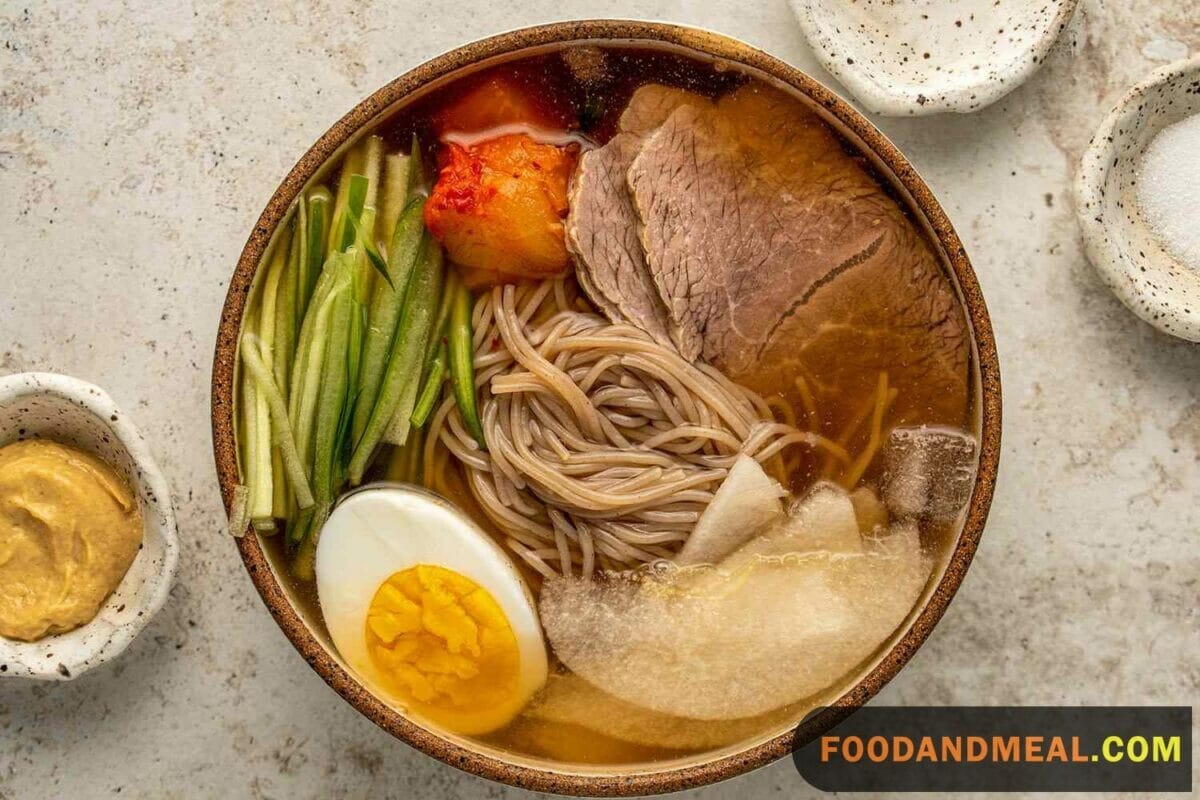
Korean Cold Buckwheat Noodles Recipe
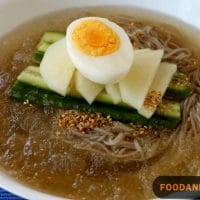
COLD BUCKWHEAT NOODLES
Equipment

Ingredients
- 2 cups chicken broth
- 2 cups low-sodium beef broth
- 1 tablespoon brown rice vinegar
- 2 tablespoons white vinegar
- 1/4 pound buckwheat noodles (naengmyeon)
- Ice cubes, for serving
- 1 hard-boiled egg, halved
- 1 small Asian pear, julienned or cut into paper-thin slices
- 1/2 kirby or pickling cucumber, seeded and julienned or cut into paper-thin slices
- 1/4 cup pickled radish
- 1/2 cup cooked beef brisket or cooked chicken, sliced
- Vinegar, sugar, and Korean mustard, for serving
Instructions
- In a large bowl, mix the chicken broth, beef broth, rice vinegar, and white vinegar. Chill in the refrigerator for at least 30 minutes.
- Cook the noodles according to the package directions. Drain and rinse well in cold water.
- Distribute the noodles in 2 serving bowls, mounding them at the bottom. Cut the noodle mounds in a few places with kitchen shears after plating.
- Pour a generous amount of the chilled broth mixture over the noodles to almost cover them, and add a few ice cubes.
- Place half a boiled egg, the pear, cucumber slices, pickled radish, and beef brisket slices on top of the noodles.
- Serve immediately, with vinegar, sugar, and Korean mustard to pass at the table.
Video
Notes
Nutrition
© Food And Meal
This website provides approximate nutrition information for convenience and as a courtesy only. Nutrition data is gathered primarily from the Spoonacular Database, whenever available, or otherwise other online calculators.
Korean Cold Buckwheat Noodles Cooking Tips
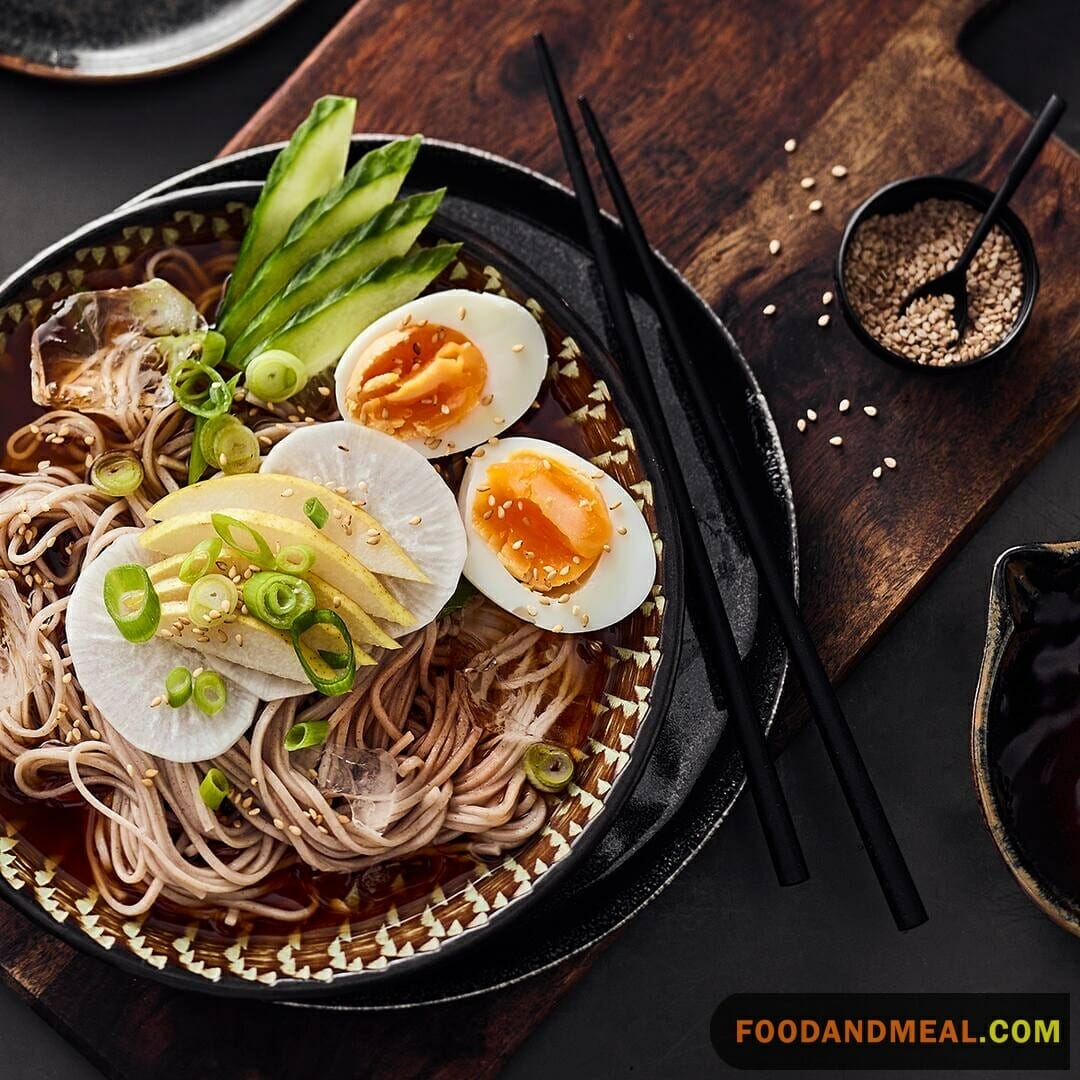
When I first tried making my mom’s cold buckwheat noodle salad, I definitely hit some snags before getting the perfect chewy, nutty and tangy texture. After seeking her sage guidance, I want to share a few handy cooking tips so you can nail this recipe on the first try!
First, properly rinse the dried noodles to remove excess starch and prevent gumminess. I learned this the hard way when my first batch turned into a gloppy mess! Gently rubbing the strands under cool water restores the bouncy texture once cooked.
Next, the umami-packed dressing is key. Whisk together the soy sauce, rice vinegar and sugar until smooth before mixing in the pungent Korean mustard for a complex flavor base. I admit my early attempts at dressing were weirdly bitter and thin. Rookie mistake!
Finally, don’t overmix the noodles and dressing. Gently lifting and folding them together prevents the strands from getting soggy. Allow the ingredients to mingle on their own to create lovely variations in taste and mouthfeel in each bite.
Korean Cold Buckwheat Noodles Serving Suggestions
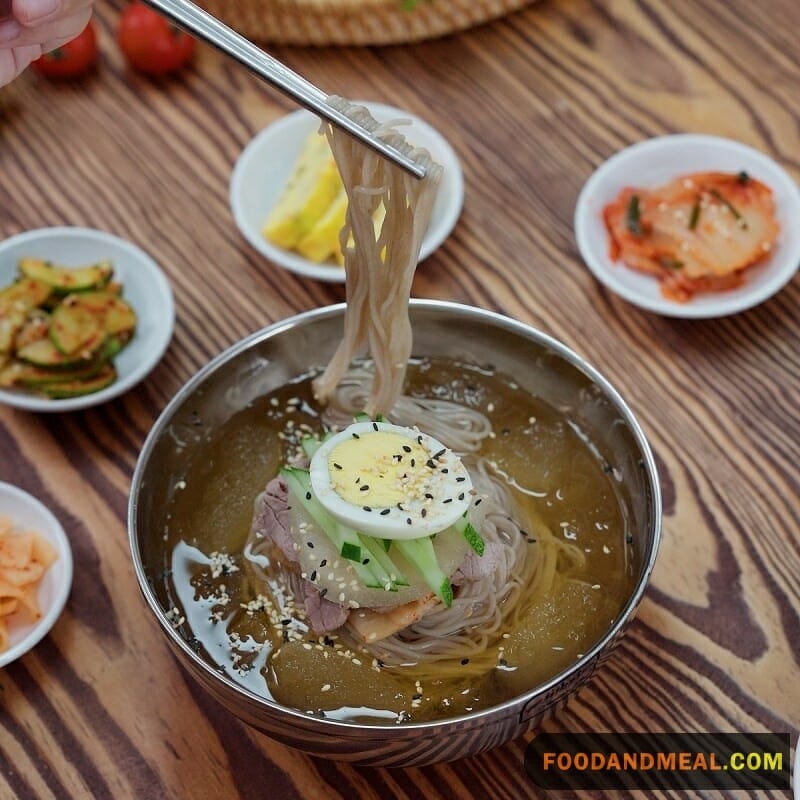
Korean Cold Buckwheat Noodles, or “Mul Naengmyeon,” offer a refreshing culinary experience, and there are numerous delightful serving suggestions to enhance your dining adventure. Pair these chilled noodles with natto for a unique texture and added protein, or indulge in the perfect combination by serving them alongside gyoza. For an extra kick, add a dollop of wasabi, or satisfy your crunch cravings with a side of karaage (Japanese fried chicken). Elevate the dish with the richness of sashimi slices, infusing a delightful seafood twist into the cold buckwheat noodles. Accompany your meal with a refreshing glass of soy milk or explore a creamy and nutty alternative with oat milk. Experiment with diverse noodle combinations by serving yakisoba on the side, and dip the buckwheat noodles in mentsuyu for an extra layer of savory flavor. Complete the culinary journey with the subtly sweet taste of rice milk. Feel free to mix and match these serving suggestions to create a customized and delicious feast with Korean Cold Buckwheat Noodles.
FAQs about Korean Cold Buckwheat Noodles
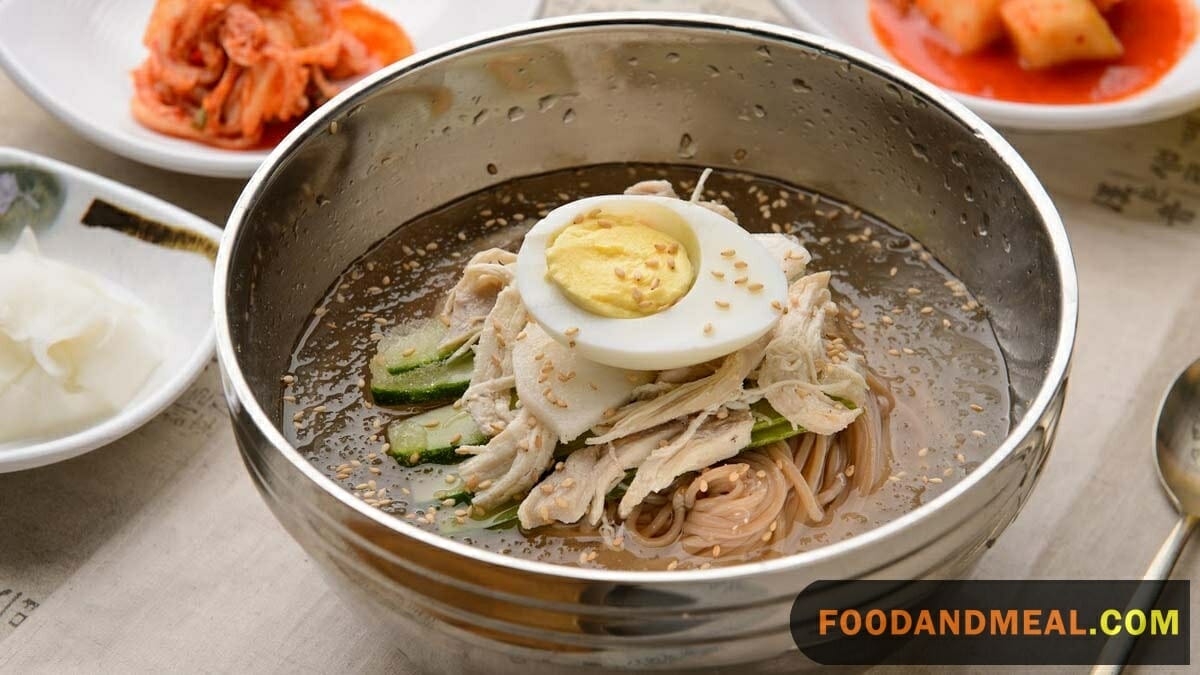
- Can you eat buckwheat noodles cold? Yes, buckwheat noodles, especially in dishes like Korean Cold Buckwheat Noodles (Mul Naengmyeon), are traditionally enjoyed cold, offering a refreshing and cooling experience.
- What do cold buckwheat noodles taste like? Cold buckwheat noodles have a unique earthy and nutty flavor. The chilled temperature enhances the refreshing and light taste, making them a perfect choice for warmer days.
- What is the difference between soba and naengmyeon? While both soba and naengmyeon are noodle dishes, they differ in ingredients and preparation. Soba is Japanese and primarily made from buckwheat, while naengmyeon is Korean and includes starches like sweet potato and arrowroot, providing a chewier texture.
- Are buckwheat noodles healthier than pasta? Buckwheat noodles tend to be a healthier option compared to traditional pasta. They are gluten-free, lower in calories, and contain beneficial nutrients like fiber and minerals.
- What type of meat can I use in the broth? Traditionally, the broth is prepared using beef. However, for a lighter version, you can opt for chicken. Vegetarians can skip the meat and enhance the broth with veggies and kelp.
- Can I make this dish in advance? Absolutely! In fact, refrigerating the broth overnight helps in intensifying the flavors. Just ensure you assemble it just before serving to retain the noodle’s texture.
- How do I store leftovers? Separate the noodles from the broth. Store them in airtight containers in the refrigerator. When ready to eat, combine and enjoy! It’s best to consume within a day or two.
- My dish turned out too bland. Any quick fixes? A splash of soy sauce, a hint of sesame oil, or some finely chopped green onions can add depth and layers to the flavor.
- Is there a gluten-free version of this dish? Certainly! Opt for 100% buckwheat noodles which are gluten-free. Just ensure you double-check the packaging to confirm.
Conclusion
In conclusion, I hope these Korean cold buckwheat noodle tips help you achieve noodle bliss in your own kitchen. Properly rinsing, nailing the umami dressing, and gently mixing are key to these satisfying and refreshing noodles.
As I wrap up this Food and Meal blog journey, I’m feeling grateful that food can connect us to our roots, no matter how far we roam. Slurping these chewy strands takes me right back to my grandmother’s table. I hope you all find similar joy in cooking and sharing recipes from your own backgrounds.
If you try this cold noodle salad, let me know in the comments! I’d love to see your creations and tweak ideas. For more Korean recipes and writing inspiration, be sure to check Food and Meal regularly. Until next time, happy cooking and eating!
Hi! I'm Nazia of ‘Nazia Cooks’, a self-taught baker and cook residing in Chennai. Rooted in the rich South Indian culinary landscape, my palate has expanded to embrace global flavors. I revel in crafting fusion dishes, melding traditions to birth unique tastes.


